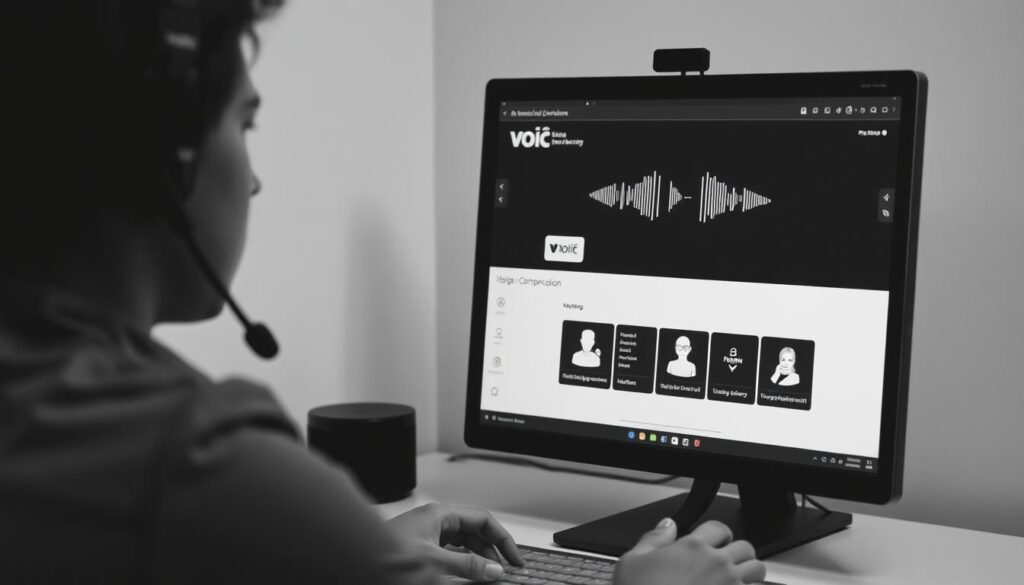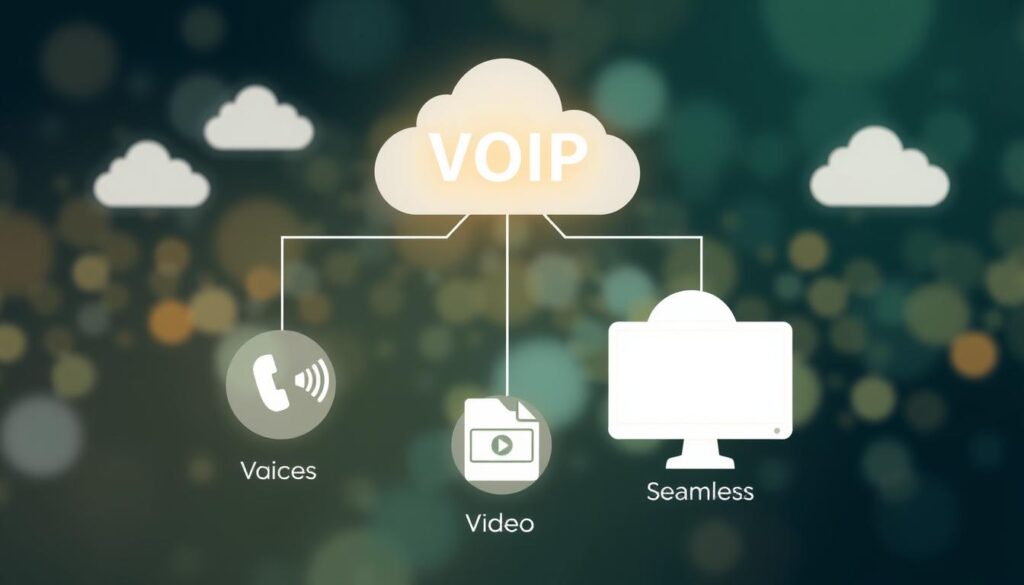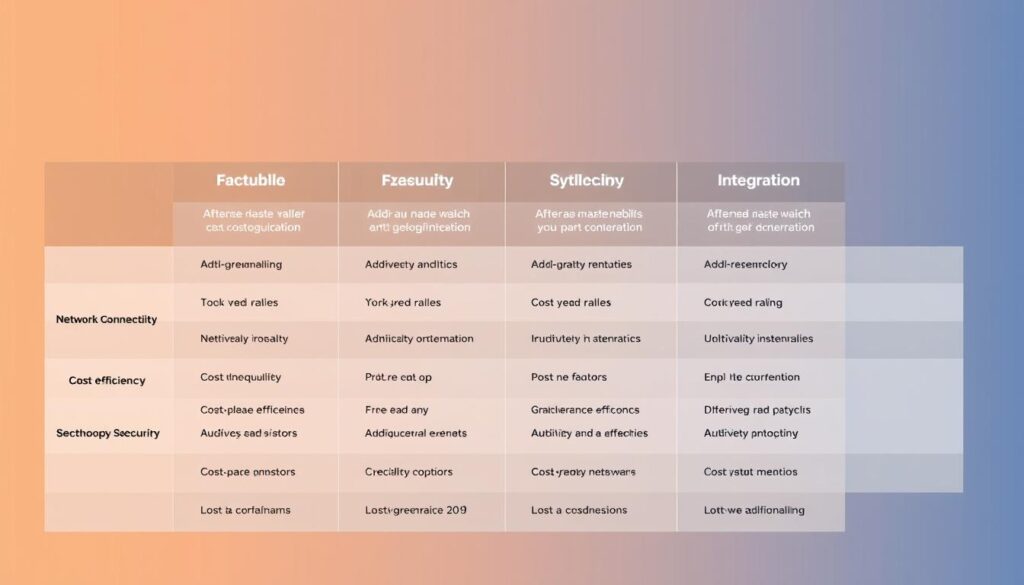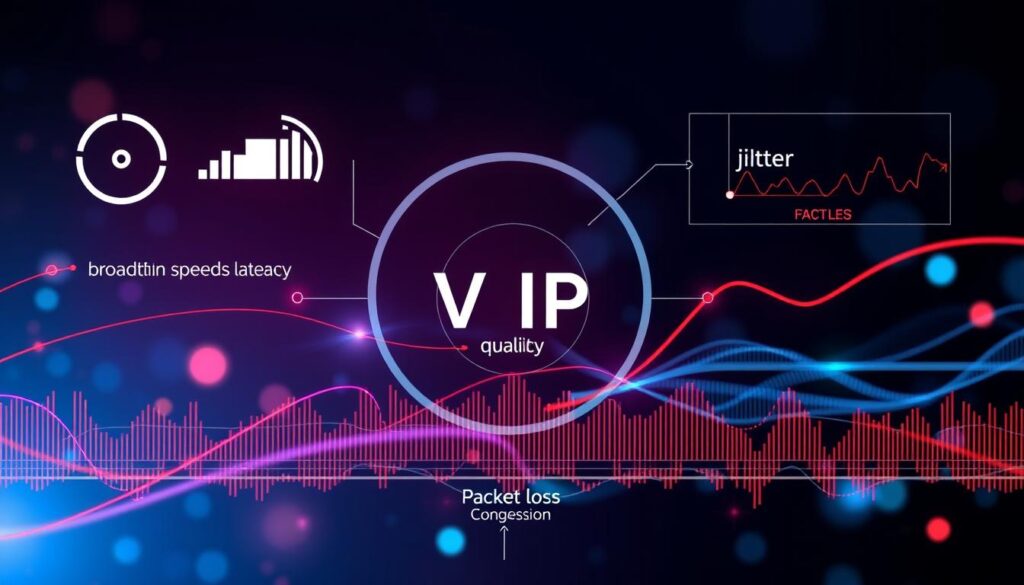Voice over Internet Protocol (VoIP) has revolutionized phone calls. It uses the internet to connect people worldwide. VoIP makes talking cheaper and easier than ever before.
VoIP services let you call using computers, smartphones, or special phones. These calls travel through the internet, not old phone lines. This new method offers lower costs and more features.
VoIP allows calls from any place with internet access. This flexibility suits both personal and business needs. Many companies now use VoIP to cut costs.
It also helps businesses improve customer and team communication. VoIP’s advantages make it a popular choice for modern communication needs.
Key Takeaways
- VoIP uses the internet to make phone calls
- It’s often cheaper than traditional phone services
- You can use VoIP on computers, smartphones, and special phones
- VoIP offers more features than regular phone lines
- Many businesses use VoIP to save money and work better
- You can make VoIP calls from anywhere with internet access
Understanding VoIP Technology Basics
Voice over Internet Protocol (VoIP) has transformed communication in recent years. It’s gaining popularity as traditional landlines decline. VoIP offers flexibility, cost benefits, and advanced features for homes and businesses.
Definition and Core Concepts
VoIP software enables phone calls over broadband internet. It converts voice to digital data and sends it via the internet. VoIP providers set up calls and manage network infrastructure.
Evolution of Voice Communication
VoIP marks a big leap from copper-wire landlines in telecommunications. Many businesses use VoIP, especially with remote work on the rise. Skype, FaceTime, and WhatsApp use VoIP technology without users knowing.
Key Components of VoIP Systems
VoIP systems consist of several crucial elements:
- Broadband internet connection
- VoIP-enabled devices (phones, computers, smartphones)
- VoIP software
- VoIP service provider
| Feature | Traditional Landline | VoIP |
|---|---|---|
| Call Quality | Consistent | Higher (provider-dependent) |
| Flexibility | Limited | High (global access) |
| Cost | Higher | Lower |
| Features | Basic | Advanced |
VoIP offers many advantages, but it has potential drawbacks. It relies on internet connectivity and may have security risks. Proper configuration is needed for optimal performance.
What is a VoIP Caller
A VoIP caller uses internet-based technology for phone calls. This method offers flexibility and cost-effectiveness. It’s a modern approach to communication for individuals and businesses.

VoIP systems allow calls from various devices. You can use smartphones, tablets, laptops, or computers with internet access. This versatility enables people to connect from anywhere.
Being a VoIP caller can lead to significant savings. Many services offer unlimited free calls to numerous countries. Some providers allow businesses to call over 110 destinations for free.
“VoIP technology transforms the way we communicate, offering unparalleled flexibility and cost-effectiveness for modern businesses and individuals alike.”
VoIP apps often include advanced features. These may include video conferencing, auto-attendants, and call center functions. Such capabilities enhance communication and can boost productivity.
VoIP opens new possibilities for efficient, cost-effective communication. It can revolutionize voice communication for small businesses and large enterprises alike.
How VoIP Technology Transforms Voice Calls
VoIP technology turns analog signals into digital data for internet calls. This change allows for affordable, smooth connections worldwide. It’s reshaping how we communicate across the globe.
Signal Conversion Process
VoIP begins by changing analog voice signals to digital format. This process samples the voice signal thousands of times per second. The samples are then coded into binary data for transmission.
Digital Packet Transmission
The digital voice data is split into small packets. Each packet holds part of the conversation and addressing details. These packets travel separately through the internet, finding the quickest routes.
Real-time Communication Flow
At the receiving end, packets are put back together correctly. The digital data becomes analog signals again, letting the recipient hear the caller. This process happens in milliseconds, allowing real-time talks.
| VoIP Component | Function |
|---|---|
| Codec | Compresses voice data for efficient transmission |
| SIP Trunking | Connects VoIP system to public phone network |
| Cloud PBX | Manages call routing and features |
This new way of voice communication is key to modern business phone systems. Companies can use cloud PBX and SIP trunking for better communication. These tools offer flexible, scalable, and cost-effective solutions.
Benefits of VoIP Calling Systems
VoIP services offer many advantages for businesses and individuals. These systems change how we communicate, providing cost-effective solutions. They come with rich features that meet modern communication needs.

Cost savings are a key benefit of VoIP technology. Small businesses can reduce monthly phone expenses by up to 45%. Many VoIP providers offer unlimited domestic calls at no extra charge.
This leads to significant savings compared to traditional phone services. Typical phone services usually cost twice as much as VoIP options.
VoIP features boost productivity and efficiency. These systems often include advanced tools like CRM integrations. Such tools improve customer experiences and streamline business processes.
Softphone applications let remote teams use VoIP features from anywhere. They provide real-time presence data and call management capabilities. VoIP’s scalability allows quick addition or removal of lines through online portals.
| Benefit | Description |
|---|---|
| Cost Savings | Up to 45% reduction in monthly phone costs |
| Reliability | 99.999% uptime (“five nines”) |
| Advanced Features | CRM integrations, conference calls, cloud faxing |
| Flexibility | Remote work support, easy scalability |
VoIP technology is highly reliable, with 99.999% uptime. This dependability makes it ideal for businesses of all sizes. Features like conference calling and cloud-based document sharing add to its appeal.
Over 30% of U.S. companies now use VoIP systems. This shows a growing trend in communication technology adoption.
Essential VoIP Infrastructure Components
Setting up a business VoIP system is easier than you think. You only need a VoIP subscription and a device to make calls. This could be a desk phone, laptop softphone, or mobile app.
Let’s explore the key components that make internet telephony possible. These elements work together to provide efficient communication for businesses.
Network Requirements
A strong network is vital for quality VoIP calling. Businesses need 64Kbps upstream and downstream for each concurrent call. About 1 Mbps per person is recommended.
Guaranteed bandwidth ensures consistent speed. Ethernet cables are best, but 5th generation WiFi (802.11ac) works too.
Hardware Components
VoIP hardware can be minimal. You might use IP phones, adapters, or existing devices. Session Border Controllers (SBCs) manage traffic for high performance.
Media gateways convert analog voice to digital packets. They often include features like echo cancellation.
Software Elements
The software side of business VoIP is where the magic happens. Key features typically include:
- Inbound and outbound call management
- IVR/ACD systems
- Advanced routing
- Caller ID management
VoIP codecs like G.711, G.722, and G.729 ensure high-quality audio. Cloud telephony solutions are quick to set up and require minimal IT knowledge.
They’re also BYOD-friendly, allowing teams to use various devices for calls from anywhere. This flexibility enhances productivity and communication.
“VoIP can dramatically reduce long-distance calling costs, offering a significant advantage for businesses engaged in international sales and customer service.”
Planning your VoIP architecture requires understanding your specific needs. Consider your bandwidth, communication requirements, and budget. With the right setup, you’ll enjoy efficient, cost-effective internet telephony.
This scalable solution grows with your business. It provides a solid foundation for modern communication needs.
VoIP vs Traditional Phone Systems
VoIP phone systems have transformed how we communicate. They offer major benefits over traditional phone systems. Let’s compare these two technologies.
Cost Comparison
VoIP technology is a cost-effective game-changer. Many startups are already using or planning to switch to VoIP phones. VoIP systems offer lower rates, especially for long-distance and international calls.
Many providers include unlimited local calls in their packages. This makes VoIP an attractive option for businesses of all sizes.
Feature Differences
Traditional phone systems provide basic features like voicemail and voice calling. VoIP apps, however, offer much more. They include advanced features such as voicemail-to-email, call forwarding, and video conferencing.
VoIP technology can integrate with UCaaS platforms. This enables screen sharing and messaging features. These tools enhance collaboration and flexibility in the workplace.

Infrastructure Requirements
VoIP phone systems need minimal hardware. They rely on internet connectivity for call routing. This setup reduces installation and maintenance costs significantly.
Traditional systems require physical wires and hardware at customer locations. VoIP’s simple infrastructure is ideal for remote work and streamlined communication systems.
| Aspect | VoIP | Traditional Phone Systems |
|---|---|---|
| Cost | Lower rates, especially for long-distance calls | Higher costs, especially for international calls |
| Features | Advanced features like video conferencing, screen sharing | Basic features like voicemail, call waiting |
| Infrastructure | Minimal hardware, internet-based | Physical wires and hardware required |
| Maintenance | Lower maintenance costs | Higher maintenance costs |
| Flexibility | Can be used on various devices | Limited to physical phone lines |
Security and Privacy in VoIP Communications
VoIP phone systems have changed how we communicate. Many people question their security. Reputable providers take extensive measures to safeguard your calls.
Internet calling through VoIP encrypts your conversations. This makes them harder to intercept than traditional phone lines. 94% of companies have strengthened their VoIP infrastructure for better security.
Encryption protects both your voice data and personal information. VoIP phones offer advanced security features for your safety.
- Call encryption
- Secure voicemail with email delivery
- Real-time monitoring for unusual activity
- Strict enforcement of toll-free calls
These measures prevent unauthorized access and toll fraud. Many providers use military-grade security protocols. They also use Session Border Controllers for security and call quality.
VoIP systems are generally secure, but stay vigilant. Using a Virtual Private Network (VPN) can boost your privacy. It reduces exposure to unwanted calls by up to 40%.
Choose a reputable provider and follow best practices. This way, you can enjoy VoIP benefits while keeping your communications safe.
VoIP Call Quality Factors
VoIP has changed how we make online voice calls. Call quality can vary, though. Knowing key factors helps users get the best from their VoIP providers.
Bandwidth Requirements
Good VoIP calls need enough bandwidth. At least 100 kbps on both ends boosts call quality. Heavy streaming can affect voice call bandwidth.
Latency and Jitter
Latency affects call timing. A 20 ms delay is normal, but over 150 ms can hurt quality. Jitter happens when data packets arrive unevenly, disrupting audio.
Both can cause awkward talks and missed info.
| Factor | Acceptable Range | Impact on Call Quality |
|---|---|---|
| Latency | Up to 150 ms | Minimal impact |
| Latency | Over 300 ms | Significant disruptions |
| Packet Loss | Less than 1% | Barely noticeable |
| Packet Loss | Over 1% | Detectable quality issues |
Network Optimization
To boost VoIP quality, use QoS to prioritize voice traffic. VLANs help manage network congestion well. Regular system checks improve call reliability.

By addressing these factors, users can enjoy clear VoIP conversations. This lets them make the most of their chosen VoIP providers.
Business Applications of VoIP Technology

VoIP technology has transformed how businesses communicate. It allows companies to handle up to 50 calls at once. This improves call management and integrates with other business tools like CRM systems.
VoIP providers offer budget-friendly options for companies. Businesses can save 50% to 75% on monthly phone bills. Employees enjoy the flexibility, with 60% appreciating remote communication options.
Key business uses of VoIP include:
- Customer service enhancement
- Streamlined internal communications
- Facilitation of remote work
- Integration with business tools for increased productivity
- Cost-effective international calling
VoIP technology improves customer experiences. Studies show 75% of consumers report better interactions with companies using VoIP. Employees can work from anywhere with a broadband internet connection.
| VoIP Feature | Business Benefit |
|---|---|
| Call queuing | Improved customer service |
| Voicemail transcription | Enhanced message management |
| Video conferencing | Better team collaboration |
| Call recording | Quality assurance and training |
VoIP users are expected to reach 3 billion worldwide by 2025. This technology is shaping the future of business communications. Companies can boost operations, cut costs, and increase productivity with VoIP.
Mobile VoIP Solutions and Applications
VoIP technology has changed how we communicate on mobile devices. Users can make calls anywhere using broadband or Wi-Fi. This flexibility has increased VoIP use for personal and business needs.
Popular VoIP Apps
Many VoIP apps offer features beyond traditional phone systems. These include high-quality calls, messaging, and video chat. Some popular options are:
- Skype
- Zoom
- Google Voice
Mobile Integration Features
Modern VoIP systems work seamlessly with mobile devices. Users can switch between desk phones and smartphones without issues. This integration allows for various features:
- Call forwarding
- Voicemail-to-email
- Virtual receptionist
Cross-platform Compatibility
VoIP solutions, including sip trunking, work on different platforms. Users can access VoIP services on various devices and operating systems. Your VoIP service stays consistent across iPhones, Android devices, and computers.
Mobile VoIP solutions are great for remote workers and salespeople. They help businesses cut communication costs while improving flexibility and efficiency.
Setting Up VoIP for Personal Use
Setting up Voice over IP (VoIP) for personal use is easy. You only need a broadband connection and a router. Let’s explore how to start with this modern communication tech.
First, pick a reliable VoIP provider. Many cloud PBX services offer affordable personal plans. Compare features and pricing to find your best fit.
There are two main options for personal VoIP use:
- Softphone: Use your existing devices with a VoIP app
- VoIP phone: Purchase a dedicated IP phone
Softphones can save you up to $20 per month compared to regular mobile plans. VoIP phones cost from $65 for basic models to hundreds for advanced ones.
Check if your internet meets VoIP’s minimum requirements. You need at least 1 Mbps upload and download speeds. For the best call quality, 5 Mbps is recommended.
| Setup Component | Recommendation |
|---|---|
| Internet Speed | 5 Mbps or higher |
| Connection Type | Wired Ethernet (preferred) |
| Router Settings | QoS enabled for VoIP |
Following these steps ensures clear calls and advanced features like call forwarding. VoIP can cut your monthly phone bills by up to 60%. It’s a great choice for personal communication needs.
Common VoIP Features and Services
VoIP services have transformed business communication. They offer a wide range of features that boost productivity. These tools streamline operations for companies of all sizes.
Call Management Tools
Modern business VoIP systems provide powerful call management tools. Call forwarding, used by 76% of users, ensures no missed opportunities. Voicemail-to-email keeps teams informed even when away from their desks.
Auto-attendants offer 24/7 front desk service. This improves customer experience without increasing labor costs.
Advanced Communication Features
VoIP services offer cutting-edge communication tools. Video conferencing enables face-to-face interactions for remote teams. HD voice calls deliver superior audio quality, beating most standard landline calls.
Interactive Voice Response (IVR) systems handle high call volumes efficiently. This frees up staff for more complex tasks.
Integration Capabilities
VoIP features blend seamlessly with other business tools. This boosts overall efficiency. Many businesses use virtual VoIP numbers to maintain a local presence.
Call analytics provide insights into call volumes and durations. This helps companies optimize their operations. Integration with platforms like Microsoft Teams enhances collaboration.
The VoIP market is growing rapidly. By 2025, over half of businesses will likely use VoIP technology. It offers cost savings and scalability to drive growth.
Conclusion
VoIP calling has transformed communication, offering a cost-effective alternative to traditional phone systems. The global VoIP services market is expected to reach $102.5 billion by 2026. Businesses are adopting internet telephony to improve operations and customer service.
VoIP technology brings many advantages. It enables digital file sharing during calls and customizable caller IDs. VoIP systems integrate seamlessly with CRM software and provide flexible scaling options.
Businesses can adjust phone lines as needed and pay only for necessary features. This adaptability is essential in today’s fast-paced business world.
VoIP calling will continue to evolve with more advanced features. It will offer improved call quality and enhanced communication capabilities. Switching to VoIP could greatly improve your communication setup while cutting costs.
Voice communication is changing rapidly. VoIP is paving the way for a more connected and efficient future.





